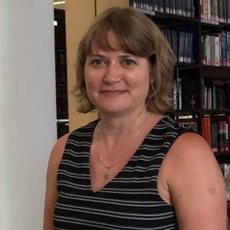 1. What is your role within the History department? I am a Lecturer in Latin American History. I’m also Brazil Lead for the College of Arts and Law and I’ll be convening the Global History MA starting in Autumn.
1. What is your role within the History department? I am a Lecturer in Latin American History. I’m also Brazil Lead for the College of Arts and Law and I’ll be convening the Global History MA starting in Autumn.
2. What are your research interests? I research Brazilian history. I focus on the 19th and 20th centuries and my interests are in social and cultural history. I’m finishing a book on the development of a regional identity in the Brazilian Northeast and international interaction and I’m starting a project on women historical icons and representation.
3. Where did you study (UG, PGT, PGR etc.)? I did my undergrad at the University of Michigan-Flint, where I got a BA in Spanish with a minor in International Studies and a BA in French. I did a one-year postgraduate course in Teaching the History of Arts and Religions at the Universidade Federal Rural de Pernambuco in Brazil and then a Master’s in Education focusing on History and Theory of Education at the Universidade Federal de Pernambuco in Brazil. I received an MA in History and a PhD in History from Vanderbilt University in the USA. I was a Past & Present Research Fellow at the Institute of Historical Research in London and an Andrew W. Mellon Postdoctoral Fellow at Tougaloo College in the USA.
4. Did you always know you wanted to go to university or in to academia? Yes, but I did not know if it would be possible. I am the first person in my family to receive a university degree. My dad is a mechanic and my mom has held various positions. It seems silly in hindsight, but I was so intimidated with understanding how to fill out the financial aid forms that I put off starting university for two years after high school. I tended bar, tutored, and cleaned houses to get through university and joined the Peace Corps when I was done as a way to see the world and express social solidarity. I wanted to go back to get a postgraduate degree, but again, was working (now as an English teacher in Brazil) and found that my interests had shifted from when I was an undergrad. Ultimately, my interests led me to specialize in History.
5. How long did it take and how did you manage to fund and complete your PhD? I started undergraduate studies in 1996 and received my Phd in 2014. My PhD took six years. I had five years of funding from Vanderbilt University and one year of funding from the Mellon Foundation funnelled through the Institute for International Education (I was supposed to receive a Fulbright Hays, but the US Congress defunded the program after selecting recipients so these foundations stepped up for 100 of us).
6. What was your PhD on? The development of a regional identity in the Brazilian Northeast through international interactions.
7. What are you working on at the moment? I am finishing revisions based on peer reviews of my book manuscript that developed from my PhD thesis and have slowly begun research on a new project on women historical icons and representation in Brazil.
8. What made you want to become a lecturer/academic? I love teaching and I love research, so I thought it would be the perfect place for me.
9. Name three books/films/podcasts you recommend to read/watch/listen to during lockdown.
- Gabriel Garcia Marquez, 100 Years of Solitude
- Jean-Paul Sartre, No Exit
- Sam Wineberg, Historical Thinking and Other Unnatural Acts
- Bonus!: Courtney J Campbell, Allegra Giovine, Jennifer Keating, Empty Spaces: Perspectives on Emptiness in Modern History
10. What is the most historically inaccurate film or scene you have watched or read? Oof. I can’t think of anything off the top of my head!
11. Are you staying physically active during lockdown? If so, how, and do you suggest anything? I was sick for about a month, but now I’m taking my daughter for walks and working in the garden.
 12. Do you have any pets? If so, what? (Pictures encouraged!) I have a 13-year-old cat from when I lived in Brazil named Biscoito.
12. Do you have any pets? If so, what? (Pictures encouraged!) I have a 13-year-old cat from when I lived in Brazil named Biscoito.
13. What is your favourite film or TV series? I don’t have a favorite, but I’ve been enjoying Call the Midwife and Cable Girls.
14. Do you have a favourite band/album/genre of music? If so, what? I like a lot of different types and styles of music, but lately I’ve been listening to a bit more Brazilian music again. I really love Martinho da Vila, Cartola, Beth Carvalho, Chico Buarque, Luis Gonzaga, Maria Bethania, Elis Regina, Cassia Eller, and Zeca Pagodinho.
15. Do you have any unusual links or claims to fame? No.
16. What skill would you one day like to master? I would like to learn to play the banjo. I sing and play the guitar and can tinker around on a few other instruments.
17. What takes up too much of your time? Housework. Way. Too. Much.
18. What songs have you completely memorized? Oh so many of them! I love music.
19. What advice would you give to your younger self? Don’t take yourself so seriously.
20. Do you have any top tips for academic work/study for our students? Keep trying and learn to take criticism as a sign of love and care. We give out a lot of feedback and criticism in this profession and some lecturers forget that students aren’t used to that. But we only give feedback on work that we think has value and can be improved. So, really, criticism is a sign that we care. Receiving it means you need to develop a thick skin and learn to separate your feelings of personal value from individual tasks (like essays) that, ten years down the road, won’t stand out as so important, but maybe the feedback that you gained from them will! Keep trying, keep working, keep improving. We’re all works in progress.
